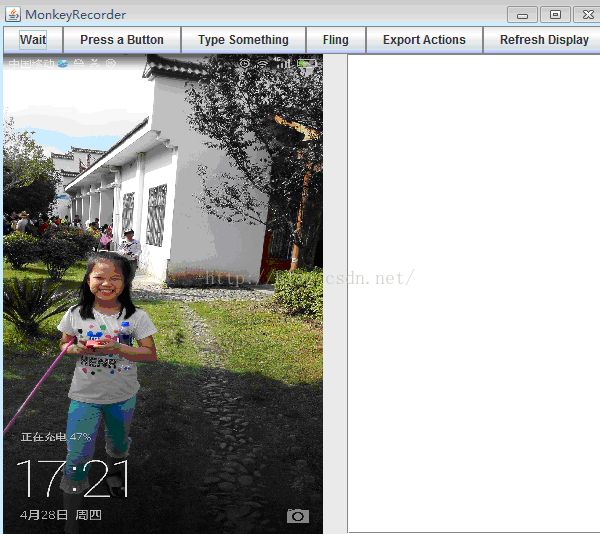Monkeyrunner实现UI自动化
准备工作:
1、安装android sdk,保证sdk文件下的tools文件夹下有一个monkeyrunner.bat文件
2、创建一个monkey_recorder.py文件,如下内容拷贝到文件内:
#!/usr/bin/env monkeyrunner# Copyright 2010, The Android Open Source Project## Licensed under the Apache License, Version 2.0 (the "License");# you may not use this file except in compliance with the License.# You may obtain a copy of the License at## http://www.apache.org/licenses/LICENSE-2.0## Unless required by applicable law or agreed to in writing, software# distributed under the License is distributed on an "AS IS" BASIS,# WITHOUT WARRANTIES OR CONDITIONS OF ANY KIND, either express or implied.# See the License for the specific language governing permissions and# limitations under the License.
from com.android.monkeyrunner import MonkeyRunner as mrfrom com.android.monkeyrunner.recorder import MonkeyRecorder as recorder
device = mr.waitForConnection()
recorder.start(device)
3、创建一个回放脚本play_back.py
#!/usr/bin/env monkeyrunner
# Copyright 2010, The Android Open Source Project
#
# Licensed under the Apache License, Version 2.0 (the "License");
# you may not use this file except in compliance with the License.
# You may obtain a copy of the License at
#
# http://www.apache.org/licenses/LICENSE-2.0
#
# Unless required by applicable law or agreed to in writing, software
# distributed under the License is distributed on an "AS IS" BASIS,
# WITHOUT WARRANTIES OR CONDITIONS OF ANY KIND, either express or implied.
# See the License for the specific language governing permissions and
# limitations under the License.
import sys
from com.android.monkeyrunner import MonkeyRunner
# The format of the file we are parsing is very carfeully constructed.
# Each line corresponds to a single command. The line is split into 2
# parts with a | character. Text to the left of the pipe denotes
# which command to run. The text to the right of the pipe is a python
# dictionary (it can be evaled into existence) that specifies the
# arguments for the command. In most cases, this directly maps to the
# keyword argument dictionary that could be passed to the underlying
# command.
# Lookup table to map command strings to functions that implement that
# command.
CMD_MAP = {
'TOUCH': lambda dev, arg: dev.touch(**arg),
'DRAG': lambda dev, arg: dev.drag(**arg),
'PRESS': lambda dev, arg: dev.press(**arg),
'TYPE': lambda dev, arg: dev.type(**arg),
'WAIT': lambda dev, arg: MonkeyRunner.sleep(**arg)
}
# Process a single file for the specified device.
def process_file(fp, device):
for line in fp:
(cmd, rest) = line.split('|')
try:
# Parse the pydict
rest = eval(rest)
except:
print 'unable to parse options'
continue
if cmd not in CMD_MAP:
print 'unknown command: ' + cmd
continue
CMD_MAP[cmd](device, rest)
def main():
file = sys.argv[1]
fp = open(file, 'r')
device = MonkeyRunner.waitForConnection()
process_file(fp, device)
fp.close();
if __name__ == '__main__':
main()
在tools文件下运行cmd:monkeyrunner monkey_recorder.py(该录制文件需要相对路径)
界面会弹出如下:
该窗口的功能:
1、可以自动显示当前手机的界面
2、自动刷新当前手机的最新状态
3、点击手机界面可对手机进行操作,同时会反应到真机,而且会在右侧空白处插入操作脚本
4、wait:用来插入下一次操作的时间间隔,点击后即可设置时间(单位:S)
press a button:用来确定需要点击的按钮,包括menu、home、search,以及对按钮的press、down、up、属性
type something:用来输入户内容到输入框
fling:用来进行拖动操作,可以向上、下、左、右,以及操作的范围
export action:用来导出脚本
refresh display:用来刷新手机界面,估计只有在断开手机后,重新连接才会用到
当我们在这个工具点击时,真机也会执行相同的操作,并且右侧会显示我们每一次点击的位置坐标,我们最好在每个操作直接插入wiat等待
然后export 脚本文件。如:d:\test.mr 录制的内容大致如下(脚本的后缀为mr)。
PRESS|{'name':'MENU','type':'downAndUp',}
WAIT|{'seconds':2.0,}
TOUCH|{'x':432,'y':1376,'type':'downAndUp',}
WAIT|{'seconds':4.0,}
TOUCH|{'x':560,'y':140,'type':'downAndUp',}
TOUCH|{'x':465,'y':148,'type':'downAndUp',}
TYPE|{'message':'nike',}
WAIT|{'seconds':4.0,}
TOUCH|{'x':975,'y':148,'type':'downAndUp',}
DRAG|{'start':(432,1449),'end':(432,289),'duration':1.0,'steps':10,}
最后cmd运行刚才录制生成的脚本如下:
预期的结果就是我们刚才在手机上所进行的操作。


